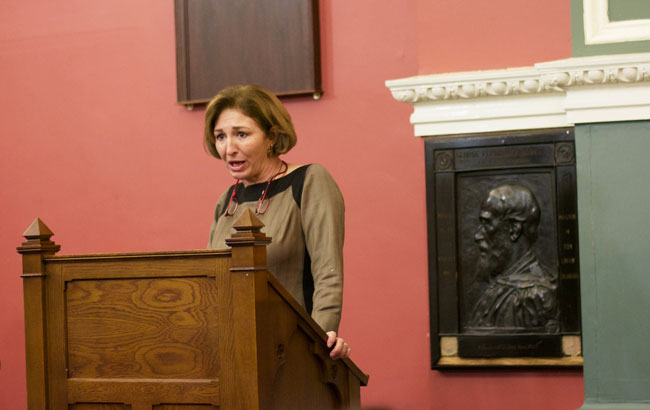
Visiting Trinity Law Society (LawSoc) yesterday, Slaughter laughed: “I’m often introduced as ‘Anne-Marie Slaughter, she thinks women can’t have it all’, and I want to shoot myself.” In this instance, however, she was lauded as so much more – an international lawyer, foreign policy analyst, political scientist and public commentator – and was awarded the Praese Elit award from the society.
Yesterday evening, the former Dean of Princeton University’s Woodrow Wilson School of Law and Director and Professor at Harvard University’s Law School presented a talk focusing in on the concept of the lawyer and the political, posing the question as to why lawyers still make the best politicians. In Slaughter’s opinion, it is not necessarily that they make the “best politicians,” but perhaps instead that they are the best “wielders” of political power.
She spoke of how it seems that, of late in the US, lawyers have fallen out of fashion within government circles, and indeed the recent loss of Hillary Clinton, a lawyer, to a businessman, Donald Trump, in the US presidential race stands to affirm this. She illustrated the preconceptions and misinterpretations that exist in relation to the profession: that lawyers will say anything for anybody, that they are simply there to facilitate powerful interests taking charge, and that law is a world of words, not actions, where one might talk the talk, and do nothing but talk. She then spoke of the nobility of the profession and the way in which such positive attributes can be found within those of the legal profession can be advantageous in a life of politics. She reflected on that which is gained in one’s training to become a lawyer, whereby “we train you to hear arguments from both sides. You must place yourself in the shoes of the opposing side and understand from where they’re coming before you respond, otherwise your words mean nothing, They’re just words”.
She believes that this allows for a foundation of tolerance and mutual respect, stating that: “Without tolerance, we cannot live in any democracy.”
In addition, Slaughter offered the idea that the law, far from enabling power unconstrained, acts as a mantle of restraint due to the way in which common law accumulates law over time by way of precedent, the giving of weight to such precedent acting as a means of control in and of itself. At a time when the future of Roe v Wade – a landmark decision by the Supreme Court on the issue of abortion – looks uncertain, she emphasised how “profoundly glad” she is that the US “is not currently a civil law country,” citing the role of the court in common law. She predicts, that due to the nature and strength of precedent as a means of enabling and restraining the power of the judge, Justice Roberts will most likely not vote against striking down Roe v Wade, which recognized that the constitutional right to privacy extends to a woman’s right to make medical decisions.
In relation to the presidential election, when asked as to whether US politics has taken a step backwards, she responded that “it’s hard to say we’ve gone forward”. She called for both parties to re-examine what they stand for, and the need to redefine themselves in the wake of Trump’s somewhat-unexpected victory, advancing the idea that a more people-centred politics should be sought, alluding to the disappearance of a centrist middle ground within current politics.
In speaking of Clinton’s defeat, she mused that we can’t make the mistake of reading gender too much into it, bearing in mind that “a majority of white women voted for Trump”. She acknowledged, however, that it could be quite some time before another woman can come as close to the White House as Clinton. On this note, she approached the position of women in the workplace, speaking of the difficulty had by women in managing both a career and a family. She reflected on her own feelings, recalling how when she was twenty five she thought only of her career, “children were something in the distant future”, finding, however, that upon turning 35, “children were all I could think about”.
She offered some advice, to “be aware, you change”, and that we can’t expect women to be both workers and primary caregivers, adding that it isn’t “enough for men just to be helpers”. According to Slaughter, progress is achievable only when we can “get young men thinking how they can balance work and family”, and calling for the need to talk to young men about this in the same way as we talk to young women. After all, how often is someone described as a working father?
In speaking of the language surrounding women and men as both parents and professionals, she spoke also of the language of law. Law may not be an absolute anchor of justice, but for Slaughter, it is perhaps the best. She referred to “justice as a feeling”, a feeling made manifest through words, and as words aspire towards justice, so too does the law.






